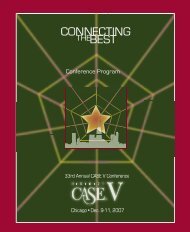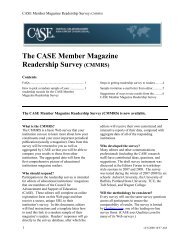Chapter 1 Why People Respond to Fundraising Letters - CASE
Chapter 1 Why People Respond to Fundraising Letters - CASE
Chapter 1 Why People Respond to Fundraising Letters - CASE
Create successful ePaper yourself
Turn your PDF publications into a flip-book with our unique Google optimized e-Paper software.
<strong>Why</strong> <strong>People</strong> <strong>Respond</strong> <strong>to</strong> <strong>Fundraising</strong> <strong>Letters</strong> 1720. <strong>People</strong> send money because you allow them <strong>to</strong> relievetheir guilt about an ethical, political, or personaltransgression, whether real or imaginedGuilt undeniably plays a role in prompting some gifts. Think of the $1 or$ 2 cash contribution mailed in response <strong>to</strong> direct mail packages containingname stickers or greeting cards, the belated membership renewals that follow along series of increasingly insistent demands, or the millions of small gifts sentevery year in response <strong>to</strong> pho<strong>to</strong>graphs of skeletal children. Our complex societyallows few of us the luxury of acting out of purely ethical motives. Compromiseis woven through the fabric of our daily lives. The fact is that none of us islikely <strong>to</strong> feel guilt - free at any time. Sometimes giving <strong>to</strong> charity, like throwingcoins in<strong>to</strong> the poor box in an earlier era, will help release the pressure.Yet I believe guilt is highly overrated as a motiva<strong>to</strong>r. Rarely will donorswho are moved primarily by guilt prove loyal over the years, and largergifts from them are relatively rare. As a fundraising strategy, guilt may bejust as counterproductive in the long run as fear.21. <strong>People</strong> send money because you give them tax benefitsNo list of motivating fac<strong>to</strong>rs for charitable giving is complete without atleast passing reference <strong>to</strong> tax benefits. Without question, the charitable taxdeduction has played a major role in stimulating many large gifts and legacygifts, because the benefits <strong>to</strong> the donor are substantial. (This is particularlytrue of gifts of artwork or other forms of appreciated property <strong>to</strong> suchinstitutions as museums, because the tax laws are specifically structured<strong>to</strong> encourage such gifts.) However, many small donors mistakenly believethey <strong>to</strong>o gain a great advantage from the tax deductibility of their gifts.That ’s why it ’ s always advisable when requesting a gift <strong>to</strong> inform the donorthat it may be deductible: this information may not help, but it can ’t hurt.Still, it ’ s dangerous <strong>to</strong> construct an appeal exclusively on the basis oftax benefits, even an appeal <strong>to</strong> buy in<strong>to</strong> a tax - reduction program such as acharitable remainder trust. Experts in planned giving advise that donativeintent — the desire <strong>to</strong> help, <strong>to</strong> do good, <strong>to</strong> make a difference — is usually offar greater importance than any financial considerations. And there are lotsof tax - reduction schemes available <strong>to</strong> well - <strong>to</strong> - do people from institutionswith no charitable purpose whatsoever.22. <strong>People</strong> send money because they feel it ’ s their dutyMany of our religious traditions teach us that it ’ s wrong <strong>to</strong> live life withou<strong>to</strong>bserving our duty <strong>to</strong> others <strong>to</strong> relieve their pain, enlarge their opportunities,
















